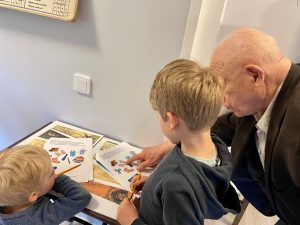Nuorten päihteiden ja nikotiinin käyttö on muuttunut merkittävästi. Perinteinen tupakointi ja nuorten alkoholinkäyttö ovat vähentyneet, mutta samanaikaisesti markkinoille on tullut…
Tekijät | Authors

Intuition in sales – strengths and perils
Steve Jobs, the founder of Apple, and English chemist Rosalind Franklin, who participated in solving the structure of DNA, have both said that they have used and use intuition. Jobs in making strategic business decisions in a complex and quickly changing operating environment and Franklin when she felt that the research was not progressing, and she could not find any options.
Intuition plays a strong part in humanity. At some level, it is in all of us. We may use it in decision-making, interaction, or reasoning, either knowingly or unknowingly.
Albert Einstein defined intuition as a sacred gift and the rational mind its faithful servant. According to Einstein, society, constructed by humans and focused on analytic reasoning, had however forgotten the role and importance of intuition.
What are we talking about when we talk about intuition?
The ways of internal knowing are called intuition. Intuition is an emotionally charged estimate or decision which is created through unconscious, quick and holistic associations. An intuitive mind is always holistic because it can process more extensive entities, too. As a way of reasoning, intuition is both complex and evolved.
Intuition is based on learning and accumulated experience. Intuition is based both on the knowledge, skills, and emotions a human being has accumulated, and the facts, concepts, models, and methods stored in our mind. The flexibility of intuition supports its developed state, which means that intuition can adapt to different situations. In addition to learning and experience, intuition can be based on noetic knowledge i.e., the appearance of ideas and knowledge.
Intuition and rational thinking are not opposites, but they complement each other. A conscious mind calculates, names and is logical and limited. Its information processing capacity is about 40–60 bits per second. Our unconscious mind works limitlessly, creatively, speechlessly and takes entities into account. Its capacity is 11 200 000 bits per second. In addition, our brain has a unique ability to utilize the memory capacity of the entire body, which has stored all the information from our entire history of experiences.
Our brain also has a unique ability to utilize the memory capacity of the entire body, which has stored all the information from our entire history of experiences.
Intuition is often divided in three or four categories. Well-functioning perception and separation capabilities form the core of the intelligent use of intuition. The first is intuition based on instincts and evolution. It often involves the fundamentals of life. It is based on survival and seeking protection; is everything okay, is there food and drink, can I work in peace, am I accepted as I am.
Another form of intuition is expert’s intuition i.e., gut feeling we are all familiar with. It is based on experience and acquired deep knowledge, facts which we can apply in different contexts even if we were not thoroughly familiar with each issue we face. We know how it is, broadly speaking, and we know it rather quickly. Based on it, we can also start to act or make decisions.
The third one is inventor’s intuition, a state which is sometimes called supernatural, independent from time and place and things happen somewhere else than in the real world, even if in fact human beings can experience this state for example in their work. It can also be described as a flow. Things just happen, texts are created, or something is solved through an epiphany and becomes true as if on autopilot. Conscious thinking and pressure have been left out.
The fourth form of intuition is often called knowing. Direct knowing, for its part, is formed of, for example, anticipation, achieving a strong understanding in a situation and immediately sensing an emotional state. Direct knowing is not based on anything previous but is enabled through the synergy of several different processes.
Intuition in sales
In several psychology studies, empathy and intuition correlate with each other, i.e., people who are empathetic are also intuitive and vice versa. Both empathy and intuition involve the ability to cross the boundaries of oneself or to view the situation from another perspective besides one’s own narrow and personal one. Sometimes empathy and intuition require courage. It is not always desirable to be sensitive, help or show one’s feelings.
Sales and marketing professionals use the different forms of intuition varyingly in their work.
Intuitive thinking takes place fast. Due to the speed of the process, intuitive thinking is a particularly valuable tool in situations which require quick decisions and there is no time for rational reasoning or fact-checking. Intuition is a useful tool in situations with multiple options. In particular, intuitive reasoning suits situations in which decisions need to be verified.
The abovementioned situation describes well what salespeople encounter in customer situations. Customers are different as are their needs and wishes. Achieving the same result takes place through many different stages or paths depending on the customer. The salesperson’s job is to support the customer on the path and provide information on the products and services, but mere information is not always enough.
You interact with the customer and in the interaction, for example expert intuition can help the salesperson get closer to the customer’s unconscious need or something the customer is unable to put into words in the moment. Especially in selling new products or complicated service entities, the salesperson can help with the customer’s decision-making by using their expert intuition, by strengthening both the knowledge base and guiding the customer in the right direction at the emotional level.
Especially in selling new products or complicated service entities the salesperson can help with the customer’s decision-making by using their expert intuition, by strengthening both the knowledge base and guiding the customer in the right direction at the emotional level.
In addition, it is useful to utilize intuitive reasoning in sales situations with uncertain views. The customer knows that something needs to be done, improved, or changed e.g., in their own production process in B2B, but does not know exactly what. Intuition can decrease uncertainty and control it, which complements the rational perspectives.
Through intuition, a good salesperson can help the customer to define the future and solve the customer’s problem. Sales is thus the solution. In addition to more complex thinking, intuition enables new ways for creative thinking, because intuition helps e.g., recognize change signals. Thus, business can be proactively guided in the direction it should go.
Due to the major changes that we nowadays constantly face, developed problem-solving is required, as solving the challenging problems in question requires fresh ideas and holistic thinking. This is what intuition is specialized in. From the perspective of noticing, perceiving, and solving problems, the separating capability of intuition in terms of necessary and unnecessary information plays a central part, as does the perception of different models and conflicts. However, more conclusive factors in problem-solving are the creativity yielded by intuition and the ability to recognize unparalleled opportunities. Intuition is inner wisdom. This is exactly what a good salesperson needs and does!
Obstacles to intuition
Intuition also has its dark side. Sometimes intuition can regress and go round in circles, so to speak. Large entities are thus solved similarly as before, even if the situation has essentially changed. We may force things into a certain mode, for example by trusting the omnipotence of Excel as a fact and this way forcing the solution, even if the true solution of the issue required considering multiple perspectives and identifying and recognizing that the issue is so complicated that normal logic or numeric does not help.
Old or outdated experience-based knowledge as the basis for expert intuition may quickly lead to wrong decisions and destroy what has at some point been achieved. Intuition is also distorted by powerful emotional ties such as loathing, fear or falling in love, similarly to rational thinking. Understanding intuition is about becoming aware and developing one’s self-knowledge. It is essential to be able to distinguish intuition from fears, wishful thinking and random whims. In addition to observing one’s own mind, questioning one’s own beliefs requires courage.
It is essential to be able to distinguish intuition from fears, wishful thinking and random whims.
Successful use of intuition requires courage to act according to it. Sometimes we do not dare to act the way we feel is right. We have many learned thoughts about what is allowed and what is not. We do not want or dare to stand out in a crowd, and this way we may ignore our intuitive messages by reasoning them rationally in the background. And, if you always appeal to authority, you might ignore your own experiences. This way your own perception and thinking abilities become narrower.
In sales, the risk is that we blindly trust certain theories and sales tools. Examples of these theories include personality models or national stereotypes, and of tools perhaps the customer data or order history provided by tools used for managing customer relationships. In sales, knowing for sure may also constitute an obstacle to using intuition. We feel that we are so experienced through both theory and practice that we lose our ability to empathize.
However, a sales situation is always unique, and the customer is always an individual, also in B2B sales. In B2B sales, preconceived attitudes for example towards a certain company may affect how we treat the customer and how we think that the decision on buying is reached in the company. We may have our own views about the company’s values, even if it were important to map the customer’s problem at hand, which our product or service could solve. In sales, the focus must be on the customer only, as multitasking, hurry and pressure weaken the situational reading skill and interaction ability of even the best of salespeople.
Conclusion
Steve Jobs, Rosalind Franklin and Albert Einstein all trusted the power of intuition. They are generally speaking considered innovators, successful and even geniuses. All three changed the way we see the world today.
Genuine presence and an accepting attitude create a sense of safety, which also leaves room for intuition.
Thankfulness, empathy, not knowing, presence, doing together and creativity promote getting into the mood for and focusing on intuition. When you are thankful, the flexibility of the mind and body increase, and room opens for new ways of seeing and doing. All three geniuses also shared the ability to calm down and turn to those close to them and their own teams when looking for solutions. They listened to others even if they had a lot of edge. Besides company, the quality of the emotions created by the company is essential. Genuine presence and an accepting attitude create a sense of safety, which also leaves room for intuition.
The article has previously also been published in Finnish.
REFERENCES:
Betsch, T. & Glöckner, A. (2010). Intuition in judgment and decision making: Extensive thinking without effort. Psychological Inquiry, 21(4), 279–294.
Dunderfelt, T. (2008) Intuitio-sisäinen viisaus.
Evans, J. St. B. T. (2010). Intuition and reasoning: A dual-process perspective. Psychological Inquiry, 21(4), 313–326.
Järvinen, P. (2018). Onnistu esimiehenä (13. painos). Alma Talent Oy.
Locander, D. A., Mulki, J. P. & Weinberg, F. J. (2014). How do salespeople make decisions? The role of emotions and deliberation on adaptive selling, and the moderating role of intuition. Psychology & Marketing, 31(6), 387–403.
Matzler, K., Bailom, F. & Mooradian, T. A. (2007). Intuitive decision making. MIT Sloan Management Review, 49(1), 13-15.
Raami, A. (2016). Älykäs intuitio – ja miten käytämme sitä. S&S.
Salonen, E. (2017). Intuitio ja tunteet johtamisen ytimessä. Alma Talent Oy.
Surel, D. (2010). Intuition and Decision-Making – A New Way of Thinking: Identifying Intuition in the Decision-Making Process: A Phenomenological Research Study. LAP LAMBERT Academic Publishing.
Toivonen, V-M. & Koivisto, M. (2010). ITSEstään-aineeton tuotanto ja henkilökohtainen kasvu.
Zinn, J. O. (2008). Heading into the unknown: Everyday strategies for managing risk and uncertainty. Health, Risk & Society, 10(5), 439–450.








